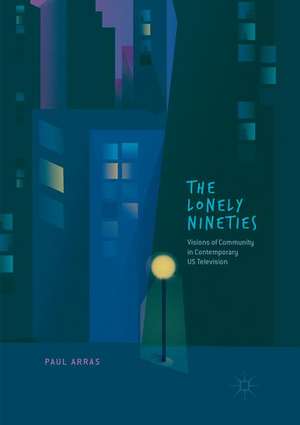The Lonely Nineties: Visions of Community in Contemporary US Television
Autor Paul Arrasen Limba Engleză Paperback – 26 ian 2019
| Toate formatele și edițiile | Preț | Express |
|---|---|---|
| Paperback (1) | 449.74 lei 6-8 săpt. | |
| Springer International Publishing – 26 ian 2019 | 449.74 lei 6-8 săpt. | |
| Hardback (1) | 528.63 lei 6-8 săpt. | |
| Springer International Publishing – 10 iul 2018 | 528.63 lei 6-8 săpt. |
Preț: 449.74 lei
Nou
Puncte Express: 675
Preț estimativ în valută:
86.06€ • 90.26$ • 71.64£
86.06€ • 90.26$ • 71.64£
Carte tipărită la comandă
Livrare economică 01-15 aprilie
Preluare comenzi: 021 569.72.76
Specificații
ISBN-13: 9783030065867
ISBN-10: 3030065863
Pagini: 238
Ilustrații: X, 238 p.
Dimensiuni: 148 x 210 mm
Greutate: 0.3 kg
Ediția:Softcover reprint of the original 1st ed. 2018
Editura: Springer International Publishing
Colecția Palgrave Macmillan
Locul publicării:Cham, Switzerland
ISBN-10: 3030065863
Pagini: 238
Ilustrații: X, 238 p.
Dimensiuni: 148 x 210 mm
Greutate: 0.3 kg
Ediția:Softcover reprint of the original 1st ed. 2018
Editura: Springer International Publishing
Colecția Palgrave Macmillan
Locul publicării:Cham, Switzerland
Cuprins
1. Watching TV after the Wall Came Down.- 2. Lonely Bowling and Other Critical Contexts.- 3. They Let You Just Sit There: The Failure of the Coffee Shop in Seinfeld, Friends, and Frasier.- 4. I’m Doing This My Own Way: Redeeming NYPD Blue’s Racist Hero.- 5. It Was a Different Time: Law & Order, White Rabbits, and the Decline of Sixties Radicalism.- 6. The Truth is Out There…and He Loves You: Depictions of Faith in The X-Files and Touched by an Angel.- 7. This Town Ain’t So Bad: Eternity in Heavenly Springfield with The Simpsons.- 8. TV after the Nineties.
Recenzii
“Arras’ use of clear and focused prose suggests a text appropriate for both graduate and upper-level undergraduate television and cultural studies courses.” (Adam Christian Clark, Historical Journal of Film, Radio and Television, Vol. 41 (1), 2021)
Notă biografică
Paul Arras is Lecturer in Communication Studies at SUNY Cortland, USA.
Textul de pe ultima copertă
This book examines the most popular American television shows of the nineties—a decade at the last gasp of network television’s cultural dominance. At a time when American culture seemed increasingly fragmented, television still offered something close to a site of national consensus. The Lonely Nineties focuses on a different set of popular nineties television shows in each chapter and provides an in-depth reading of scenes, characters or episodes that articulate the overarching “ideology” of each series. It ultimately argues that television shows such as Seinfeld, Friends, Law & Order and The Simpsons helped to shape the ways Americans thought about themselves in relation to their friends, families, localities, and nation. It demonstrates how these shows engaged with a variety of problems in American civic life, responded to the social isolation of the age, and occasionally imagined improvements for communityin America.
Caracteristici
Puts into cultural context some of the most popular and significant US television shows of the nineties, including Seinfeld, NYPD Blue, Law & Order, The X-Files, Touched by an Angel, and The Simpsons Links popular culture to key social and cultural developments of the nineties, including the rise of coffee shop culture, the Rodney King beating, the memory of the sixties, and the culture wars Examines the representations of community that primetime TV offered to its American mass audiences in an increasingly fragmented national culture















